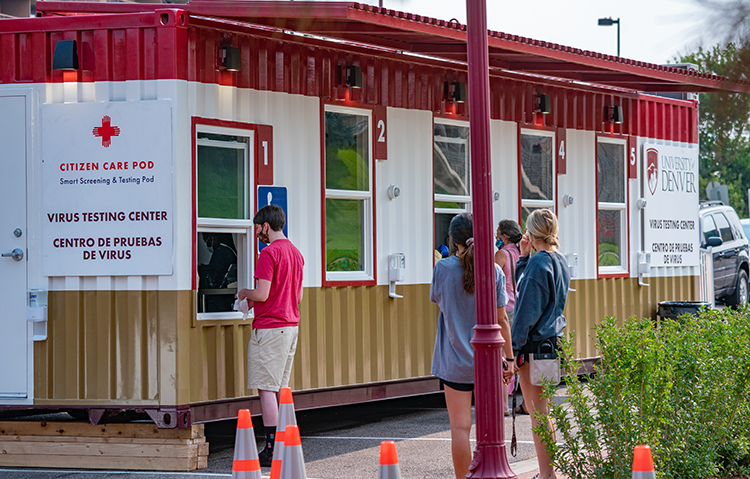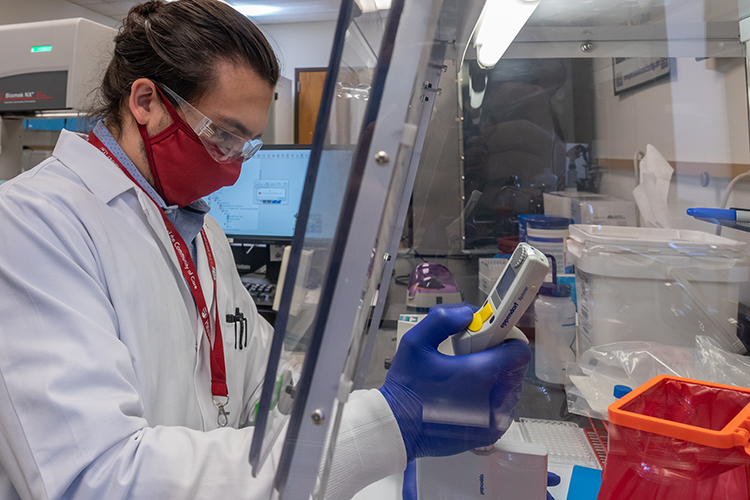Thanksgiving’s arrival and the winter break that follows through late December will provide a stern test to see whether colleges and universities can keep COVID-19 transmission under control. So far this semester, they’ve done well.
Unlike 2020, when there was deep reluctance for students and staff to travel and gather with families and friends, this year promises to be more festive and more robust, buoyed by vaccinations. But across the country, 36 states are seeing increases in positive cases and about half are reporting a boost in hospitalizations.
So how are institutions approaching these make-or-break periods? Many say they will stick by strategies that have worked since the start of the pandemic. That means keeping some mitigation protocols and hygiene practices in place while continuing to press their communities to get vaccinated and remain vigilant.
In Colorado, where case counts are all over the map but generally on the rise, the University of Denver (DU) has done exceptionally well both at planning and keeping spread low, despite the fact that positivity in surrounding communities has hung around 10%. At DU, with a 97% vaccination rate, the percentage has hovered at 0.1%.
DU is on a quarter system, so it heads into its long winter break in good shape, but campus leaders are still advising students to be cautious as they head home, take extra precautions when attending indoor events off-campus, and test before they leave for the holiday break. “The conditions in Colorado right now are very concerning; a lot of pressure on hospital staff and ICU bed capacity,” says Sarah Watamura, chair of DU’s COVID Response Team.

Testing has been a key component of keeping Denver’s campus numbers far lower than those across Jefferson County, and it will continue in 2022. When students return in early January, all will be subject to back-to-back saliva tests so that the university can isolate individuals who test positive.
A guarded approach
Brown University in Rhode Island is forging a similar strategy for Thanksgiving, according to Russell Carey, Executive Vice President for Planning and Policy. Students are being required to test on the first and fifth days of their arrivals back into Providence. Those who don’t have the vaccine must still submit to twice-weekly testing. Those PCR tests can now be done in a self-service fashion, with students conducting their own nasal swabs. The result of safety protocols and vaccinations at Brown has led to sterling results—it has not seen more than seven positive cases in a given week in more than a month.
But environments can change quickly. Berklee College of Music in Boston just pushed all programming online because of an outbreak of 37 cases. The University of Michigan, along with a handful of others, said it would keep its mask mandates in place for the entire winter semester as a precaution, with both COVID and flu cases remaining high.
Many institutions, including the University of Denver, are requiring the flu shot and are pushing students, faculty and staff to get COVID booster shots, though not requiring them yet. On Friday, the FDA approved boosters in all adults over 18.
In the state of Florida, where cases remain low, none of the major universities has a vaccine mandate in place. Florida Atlantic University in Boca Raton doesn’t require testing either, but it continues to offer free flu shots to students and remind them of the importance of adhering to safety protocols, especially as South Florida is infused with part-time residents and vacationers from northern states during the winter months.
“As the virus hopefully continues to wane, our challenge may be to continue to keep the importance of simple preventative measures in our students’ thought processes,” Jaeson Weber, Director of Emergency Management at FAU said. “The good news is that overall knowledge about viruses and prevention has increased for each individual, making it generally easier to have conversations about prevention.”

Watamura says one of the best ways campus leaders can get the message to students about getting vaccinated and remaining safe is by developing partnerships with students organizations, especially Greek Life. “We had a lot of positivity in our fraternity and sorority life communities last year,” she says. “We really have not seen that this year. Before they have an event that has visitors, they all come and get tested. There were a number of rush events this year [around Halloween] where they went to the testing location in costumes.”
Denver also has reached out to other institutions for their guidance in strategic planning to be proactive in the fight against COVID-19.
“We identified 98 schools and did intensive interviews with a set of schools that had had better fall outcomes last year than we had,” Watamura says. “We implemented our more frequent testing schedule in January of last year based on that data, and we hosted a conference about what we had learned and what others had learned. We’re going to host another conference this year focused on mental health, vaccines and boosters. We communicate with not just our peers in Colorado, but across the country, to try to take that data-driven approach.”



